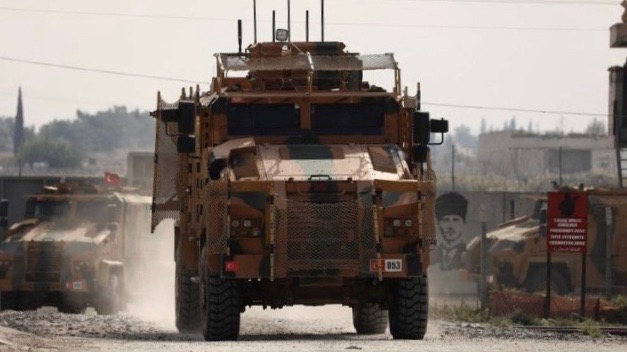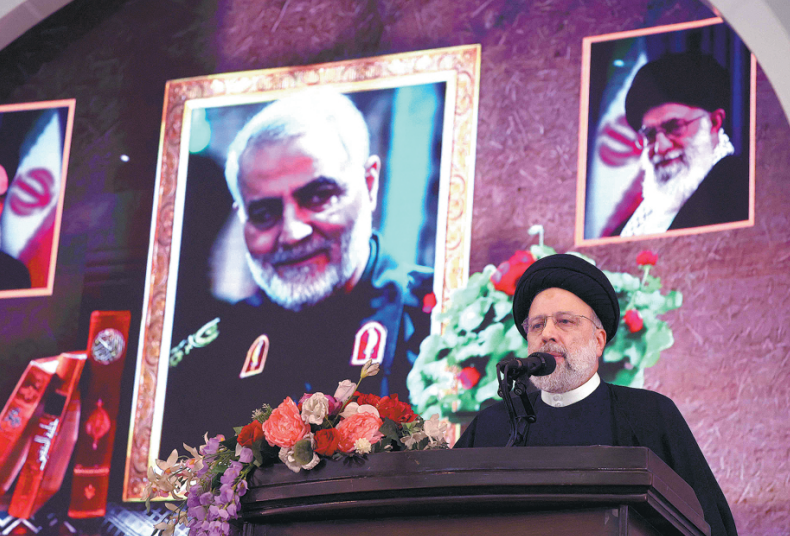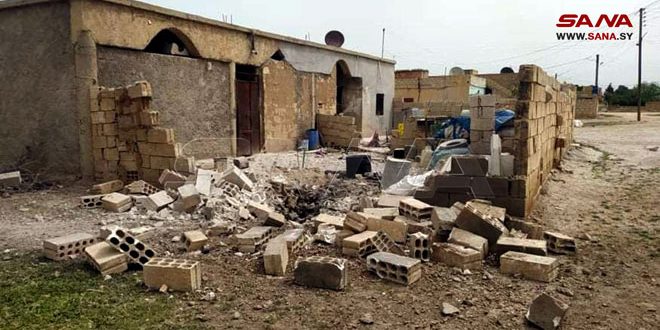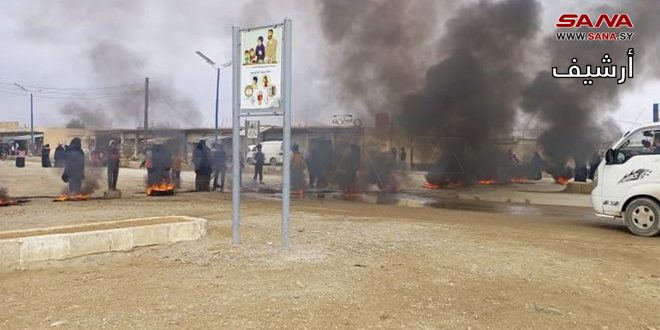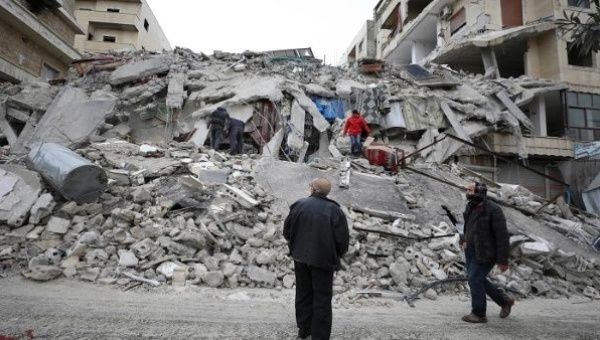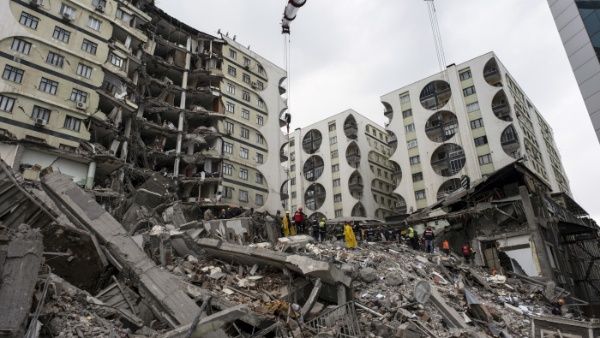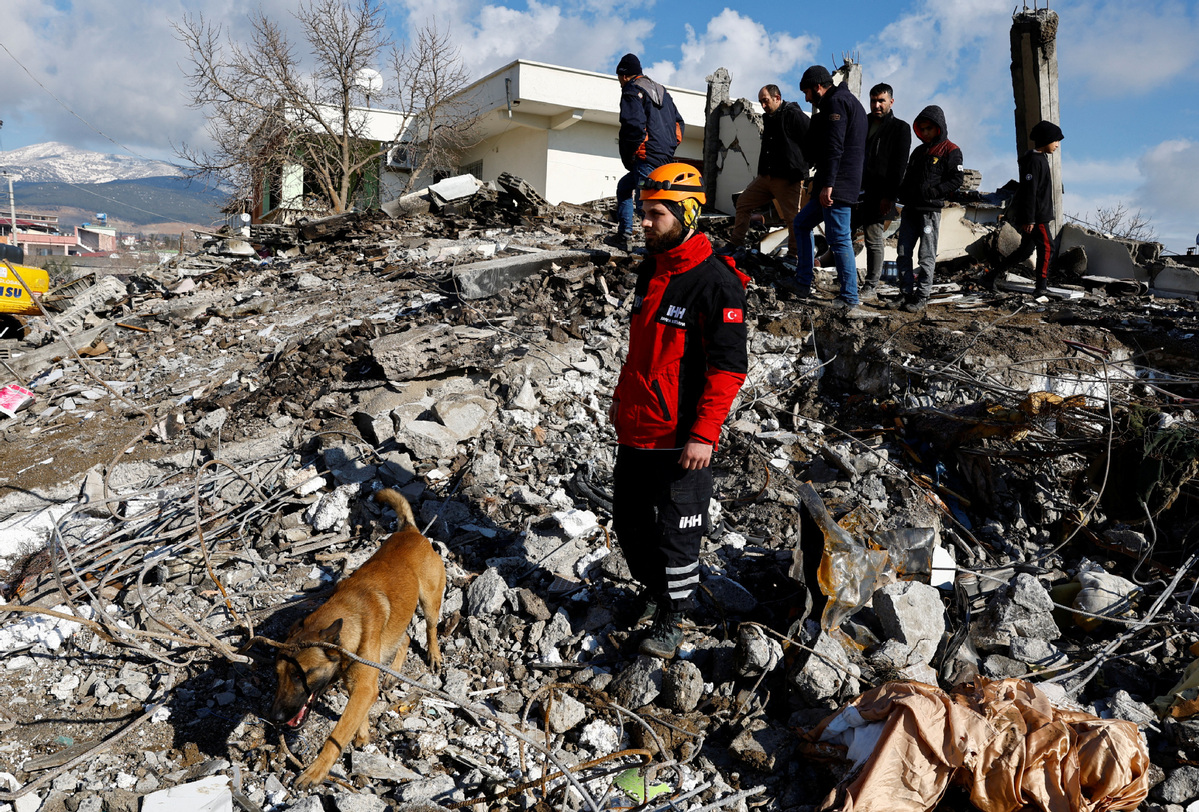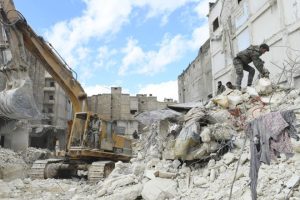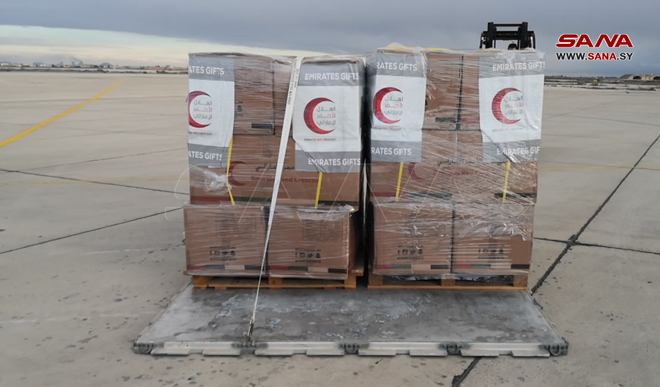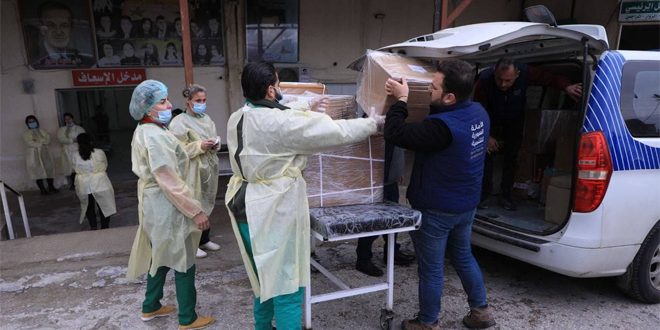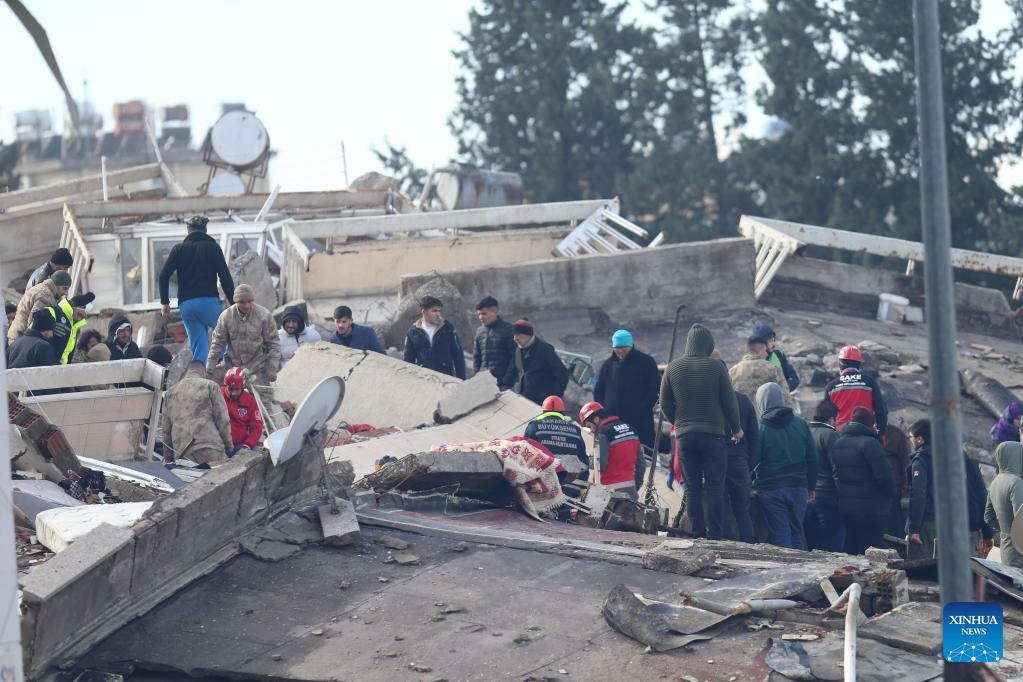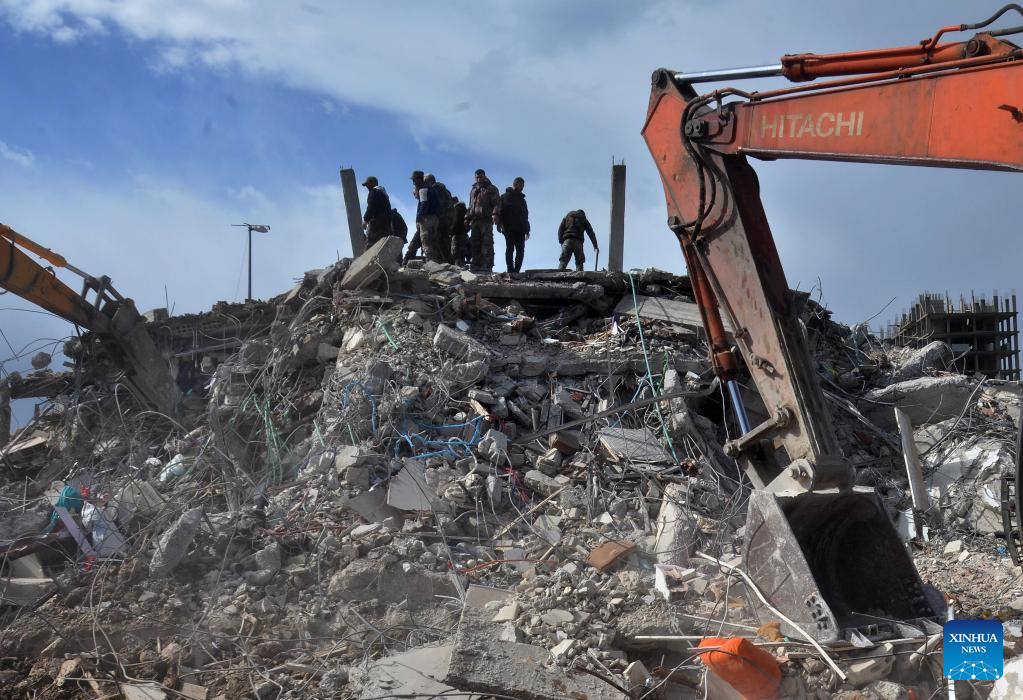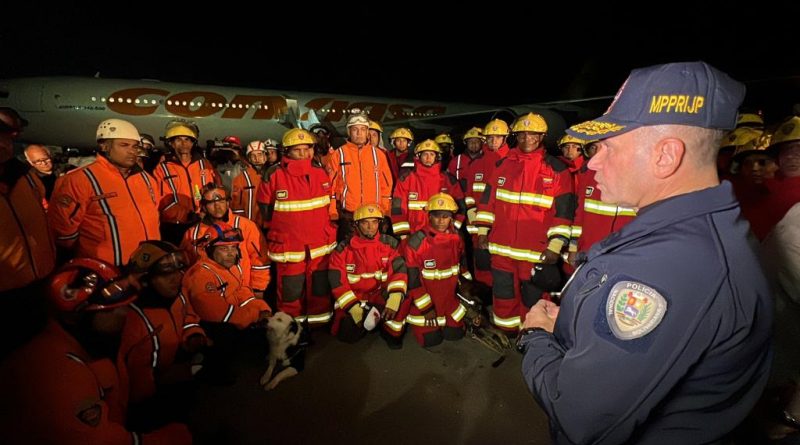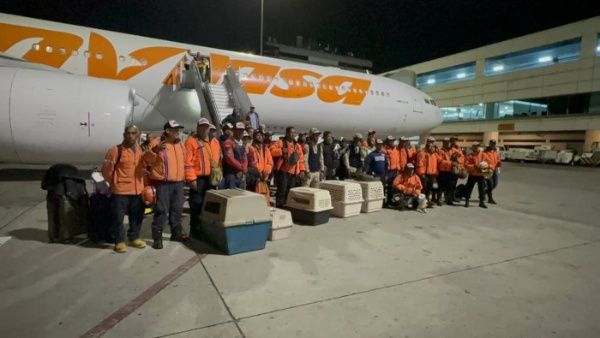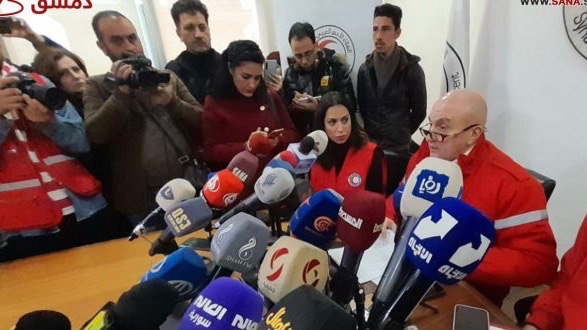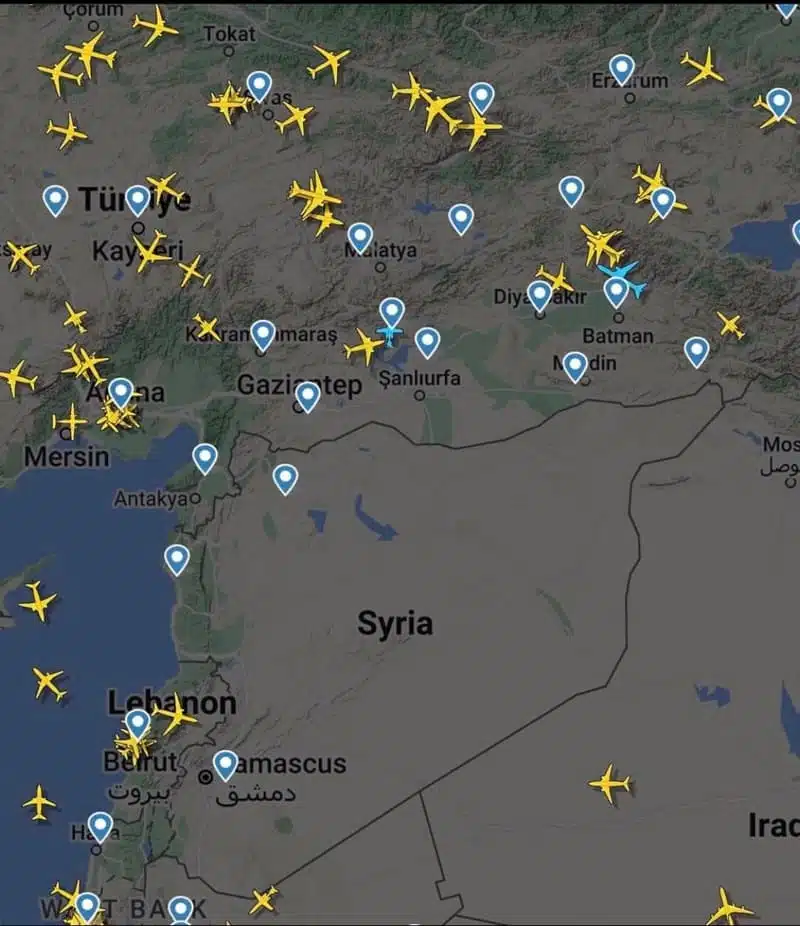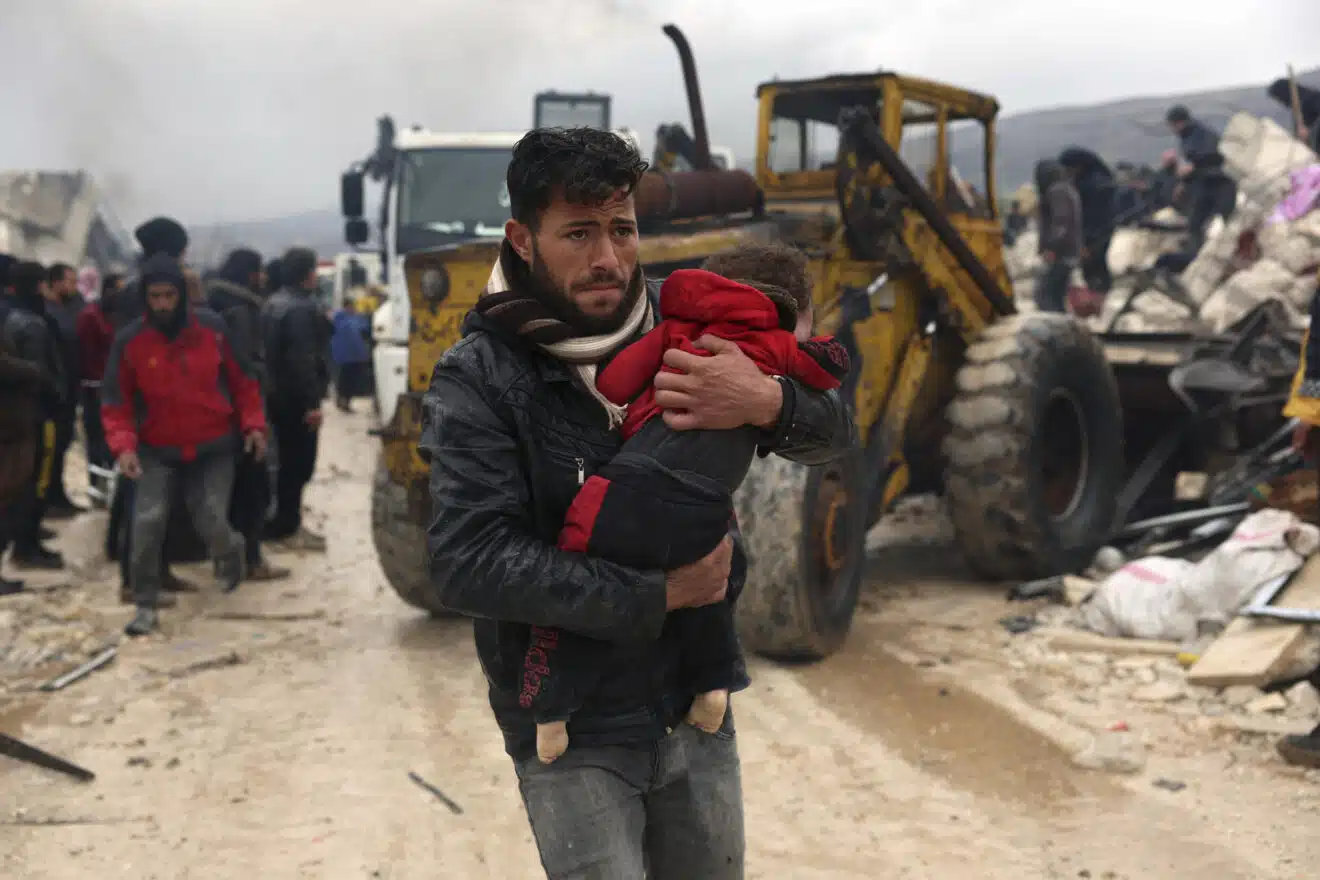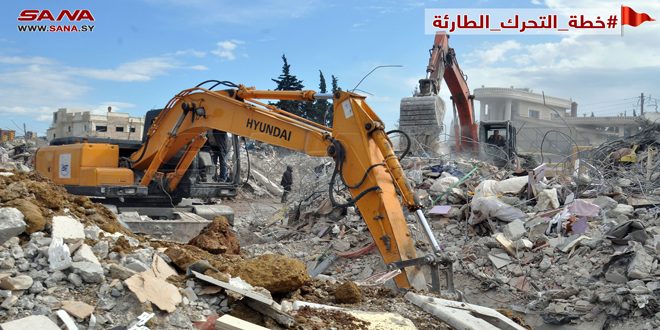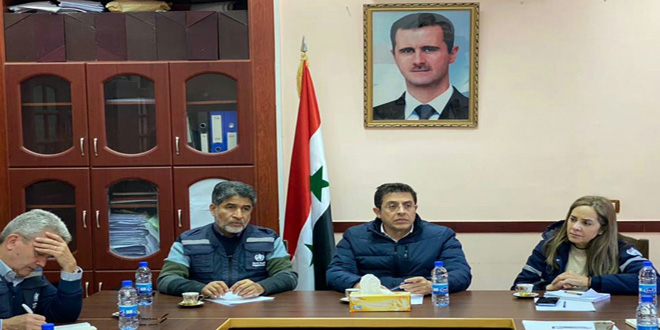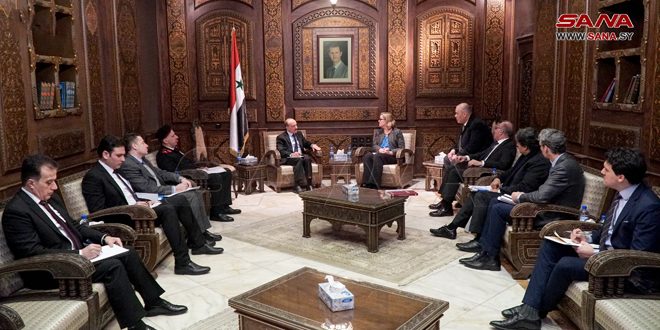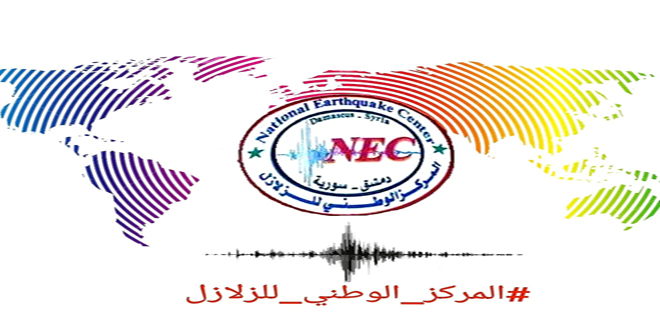Four Syrian Provinces Declared Disaster Areas

Rescue workers in Aleppo, Syria | Photo: Sputnik
Published 10 February 2023 (12 hours 59 minutes ago)
According to the Syrian Ministry of Health, the death toll so far stands at 1 387, with some 2 326 injured.
The Syrian government declared on Friday, during an emergency meeting of the Council of Ministers, the provinces of Aleppo, Latakia, Idlib and Hama as disaster areas.
The cabinet meeting headed by Prime Minister Hussein Arnous also approved the delivery of humanitarian aid through border crossings on the lines separating territories controlled by the Syrian army and those out of government control.
According to the Prime Minister, the International Red Cross and the Syrian Arab Red Crescent, as well as United Nations (UN) organizations, will ensure that aid reaches those in need.
It was authorized to process aid through the Higher Committee for Relief, as well as to create a national fund for the reconstruction of the areas affected by the earthquake.
The Ministries of Municipal Administration, Health, Public Works and Housing, Transportation and Petroleum were instructed to develop a database on all the needs required to continue rescue operations.
The government also intends to develop executive programs to deal with the devastation left in the wake of Monday's catastrophe. To this end, the creation of a database collecting information on the damage caused was also raised at the meeting.
According to the Syrian Ministry of Health, the death toll so far stands at 1 387, with some 2 326 injured. For its part, Türkiye reports 20 213 dead and 80 052 wounded, Health Minister Fahrettin Koca said.
https://www.telesurenglish.net/news/Fou ... -0017.html
Quake Displaces 5.3 Mln People in Syria: UNHCR

This photo taken on Feb. 9, 2023 shows the rubble of collapsed buildings in Latakia, Syria. | Photo: Str/Xinhua
Published 10 February 2023
The UNHCR is now focusing on the provision of shelter and relief items to ensure that the centers for the displaced have adequate facilities, such as tents, plastic sheeting, thermal blankets, sleeping mats and winter clothing.
An estimated 5.3 million people in Syria may have been left homeless by the earthquake that struck the country and Türkiye earlier this week, a United Nations (UN) official said on Friday.
Sivanka Dhanapala, the UN Refugee Agency's (UNHCR) representative in Syria, told a press briefing via video link from Damascus that "We have just had a preliminary estimate that 5.37 million people affected by the quake will need shelter assistance in the whole of Syria."
"That is a huge number and comes to a population already suffering mass displacement," he added.
He said that the UNHCR was now focusing on the provision of shelter and relief items to ensure that the centers for the displaced had adequate facilities, such as tents, plastic sheeting, thermal blankets, sleeping mats and winter clothing.
"For Syria, this is a crisis within a crisis. We've had economic shocks, COVID, and are now in the depths of winter, with blizzards raging in the affected areas," he said.
He told reporters that several UN local staff were sleeping outside their homes because they were worried about the structural damage to their houses.
"This is just a microcosm of what is happening throughout the affected areas," he noted.
Catharina Boehme, a senior official from the World Health Organization (WHO), told Friday's press briefing that the situation was desperate, and it was a race against time.
She said that WHO chief Tedros Adhanom Ghebreyesus was due to meet with local partners and affected people in Aleppo on Friday.
According to the official, the WHO has already dispatched medical and surgical supplies to 16 hospitals in northwest Syria.
"The WHO has released some 3 million U.S. dollars from its contingency funds but much more is needed," she said.
https://www.telesurenglish.net/news/Qua ... -0015.html
The Easing of the US Sanctions is Misleading: Syria

A family stands near the rubble of their home, Syria, Feb. 10, 2023. | Photo: Twitter/ @MiExecSearch
Published 10 February 2023
The Treasury Department's latest decision is a copy of previous documents that only seek to create a false impression by stipulating alleged exemptions for humanitarian purposes.
On Friday, Syria described the US decision on the partial and temporary suspension of some sanctions as misleading and false.
The Syrian Foreign Affairs Ministry explained that the U.S. Treasury Department's latest decision is a copy of previous documents that only seek to create a false impression by stipulating alleged exemptions for humanitarian purposes.
"The facts on the ground, however, prove otherwise," Syrian diplomacy said, noting that Washington still upholds its arbitrary sanctions.
"U.S. coercitive measures and policies have deprived the Syrian people of enjoying their looted natural wealth and limited the ability of State institutions to improve living conditions, achieve development goals, and provide basic services," it added.
The Treasury Department's latest decision only tries to beautify the international image of the United States, hiding that this country is responsible for "obstructing efforts to rescue those affected by the earthquake and meet the basic needs of the Syrian people."
Syrian diplomacy also requested "all countries and international organizations, which have stood by the Syrian people in their plight as a result of the devastating earthquake, to demand an unconditional lifting of the inhumane, immoral, an illegal blockade."
As of Friday noon, Syrian authorities had confirmed 3,597 deaths from the quakes. "Rescue teams are working on only 5 percent of the disaster area due to their sparse numbers and lack of spare equipment," LebUpdate tweeted.
https://www.telesurenglish.net/news/The ... -0011.html
************
Syria Under the American Whip: Sanctions That Kill
FEBRUARY 10, 2023

By The Cradle’s Syria Correspondent – Feb 6, 2023
The western sanctions weapon is not new to Syria, but since 2019 it has become a lethal one, destroying entire Syrian sectors and killing its people.
Some 83 years after being employed against Germany in 1940, economic sanctions have become the most widely-used tool in Washington’s arsenal to coerce adversarial states. Sanctions have become a parallel or alternative policy to military invasions, especially after the dollar solidified as the world’s dominant currency by being pegged to oil in 1975 – and further strengthened by the collapse of the Soviet Union in 1991.
This US financial and economic weapon has caused Syria suffering for decades, but its impact has become lethal in recent years, particularly after 2019.
Sanctions negatively affect all vital sectors of the economy, from medicine to education, energy, communications, agriculture, and industry – all the way to dealing with emergency disasters, such as the earthquake that struck Syria and Turkiye in the early morning of 6 February, which has so far led to the death of 1,300 civilians, mass injuries, and the destruction of thousands of homes.
The impact of western sanctions and the US military occupation of Syria has crippled the nation’s economy and undermined its ability to respond to major natural disasters of this kind. The situation issue pressing that the Middle East Council of Churches issued a demand on 6 February for the immediate lifting of sanctions on Syria so that Damascus can deal with the humanitarian fallout from the tragic earthquake.
In 1979, Syria was subjected to Washington’s sanctions for the first time when it was designated a state sponsor of terrorism, and banned from exporting goods and technology to the US. This came as punishment for Syria’s support of Iran during the Iran-Iraq war (1980-1988), leading also to a suspension of financial aid from Persian Gulf monarchies (approximately $1.5 billion annually) and a suffocating economic crisis, known as the “crisis of the eighties.”
Less than a decade after a short period of economic prosperity in Syria (the net domestic product increased by about 49 percent between 2000 and 2010), the 2011 foreign-backed war was launched, wreaking havoc on the Syrian economy. Widespread damage was inflicted both by the direct destruction of economic facilities and sectors during combat operations, and by a series of US-driven sanctions, which reached their peak with the 2019 Caesar Act and last year’s Captagon Act that targeted Syria’s indigenous pharmaceutical and healthcare industries.
A double stranglehold
In contrast to most cases in which the US and its EU and NATO allies employ economic sanctions to impose an external economic blockade on nations, the sanctions against Damascus are accompanied by a further internal blockade.
This is achieved by foreign military control over oil resources and critical agricultural fields in northeastern Syria – the “bread basket of the Levant” – which are under the control of the US-backed and Kurdish-dominated Syrian Democratic Forces (SDF) in the “Autonomous Administration” areas.
Damascus is thus subjected to a double stranglehold by depriving it of its oil (the main source of foreign exchange). Energy sales constitute about a quarter of Syria’s export earnings, and covers 90 percent of its domestic market needs. Before the war, in 2010, Syria produced 4 million tons of wheat, a strategic agricultural staple which provides food self-sufficiency and domestic sustenance, about a quarter of which is then exported.
Today, the country has not only lost access to its vital agricultural lands, but western sanctions prevent Damascus from importing these essential staples to feed its population.
This has exacerbated the effects of the blockade on the Syrian people, who are currently going through one of the most severe living, economic, and health crises in their modern history, and are left unable to secure basic daily needs of bread and medicine.
Informed sources tell The Cradle that Damascus is incurring double burdens to secure basic commodities – because these cannot be imported directly – which forces the Syrian government to resort to brokerage firms to circumvent US and European sanctions.
The sources point out Russia’s critical role in securing wheat for Damascus, but this too comes with a financial burden of high shipping fees. Similarly, while Iran provides oil to Syria through a credit line, its transportation is carried out by private companies that face harassment from US authorities – whether by detaining shipments (e.g. in Gibraltar and Greece) or by including participating oil tankers to US sanctions lists.
Under sanctions, Syria is facing great difficulties in rebuilding its key agriculture, industry, energy, education, and healthcare sectors which were destroyed in a war in which Washington played a leading role. Damascus has been reduced to seeking out regional alternatives and intermediary companies to circumvent its stranglehold, or receiving help from friendly countries such as Russia or Iran.
This, of course, comes with its own downsides for the US, as it helps forge closer Syrian political and economic ties with Washington’s adversaries. Today, it is Iranian companies, for example, that carry out maintenance operations and construct new power plants in Syria.
Sanctions upon sanctions
Most of the unilateral sanctions against Syria date back to 2011 when then-US President Barack Obama expanded existing punitive measures under the Syria Accountability Act (2004). The new sanctions included a ban on flights, restrictions on oil exports, financial restrictions on entities and individuals, freezing Syrian assets abroad, travel bans on Syrian officials and business leaders, and severing diplomatic relations with Damascus.
In 2019, the US enacted the Syria-specific Caesar Act, granting Washington the authority to impose sanctions on anyone – regardless of nationality – who conducts business with Syria, participates in infrastructure and energy projects, provides support to the Syrian government, or supplies goods or services to the Syrian military.
The Captagon Act, passed by the US Congress in 2022 to combat the illicit trade of a drug made famous by foreign-backed jihadists in Syria, has the temerity to blame Damascus for the origins of Captagon, and seeks to destroy what is left of the country’s renowned pharmaceutical industry.
In 2011, the EU banned exports of weapons, goods, and energy technology to Syria. It also imposed a ban on the import of Syrian oil and minerals, and any commercial and financial transactions with the Syrian energy sector. These sanctions were expanded in 2018 to include asset freezes and travel bans on individuals and entities allegedly involved in the use of chemical weapons.
Britain imposed parallel sanctions on Syria after its exit from the EU, with several allied states jumping the bandwagon, including Canada, Australia, and Switzerland. Arab countries, including Qatar and Saudi Arabia who financially and materially assisted in the war against Syria, have imposed their own variation of sanctions on Damascus too.
A Humanitarian crisis
The horrifying deterioration of Syria’s humanitarian and living conditions – as a direct result of oppressive unilateral sanctions that violate international laws and conventions – prompted the United Nations to dispatch UN Special Rapporteur on Unilateral Coercive Measures and Human Rights, Alena Douhan, to Damascus between 30 October and 10 November, 2022, to assess the impact of sanctions.
In a statement after her 12-day visit to Syria, the Special Rapporteur presented detailed information about the catastrophic effects of unilateral sanctions across all walks of life in the country.
Douhan reported that a startling 90 percent of Syria’s population was currently living below the poverty line, with limited access to food, water, electricity, shelter, cooking and heating fuel, transportation, and healthcare, and warned that the country was facing a massive brain-drain due to growing economic hardship
“With more than half of the vital infrastructure either completely destroyed or severely damaged, the imposition of unilateral sanctions on key economic sectors, including oil, gas, electricity, trade, construction and engineering have quashed national income, and undermine efforts towards economic recovery and reconstruction.”
The UN rapporteur said that the blocking of payments and refusal of deliveries by foreign producers and banks – coupled with sanctions-induced limited foreign currency reserves – have caused serious shortages in medicines and specialized medical equipment, particularly for chronic and rare diseases.
She warned that rehabilitation and development of water distribution networks for drinking and irrigation had stalled due to the unavailability of equipment and spare parts, creating serious public health and food security implications.
“In the current dramatic and still-deteriorating humanitarian situation as 12 million Syrians grapple with food insecurity, I urge the immediate lifting of all unilateral sanctions that severely harm human rights and prevent any efforts for early recovery, rebuilding and reconstruction.”
“No reference to good objectives of unilateral sanctions justifies the violation of fundamental human rights, she added, insisting that “the international community has an obligation of solidarity and assistance to the Syrian people.”
Calls to lift Syria’s sanctions
The UN report sheds further light on sanctions-targeted Syrian sectors, revealing that the Syrian economy has contracted by more than 90 percent, and that prices have risen more than 800 percent since 2019.
Hundreds of thousands of jobs have been lost, and sanctions block the importation of “food, medicine, spare parts, raw materials, and items necessary for the country’s needs and economic recovery,” Douhan reports. In addition, Syria “pays more than 50 percent higher prices compared to neighboring countries to obtain its food needs.”
The UN rapporteur has called for the unilateral sanctions that the US and EU have imposed on Syria to be lifted immediately, stressing that they are illegal under international law. “I urge the international community, and the sanctioning states, in particular, to pay heed to the devastating effects of sanctions and to take prompt and concrete steps to address over-compliance by businesses and banks,” she stated.
Her report illustrates clearly that the tightening of unilateral sanctions and trade restrictions have generated a long-term economic crisis in Syria, with an increasing rise in the level of inflation and a continuous decline in the value of the local currency from 47 Syrian lira against the dollar in 2010 to more than 5,000 lira in 2022.
Electricity and water
The sanctions have also prevented Damascus from rebuilding damaged infrastructure especially in remote and rural areas, and have caused a “shortage of electricity,” leading to daily blackouts.
The UN’s report made particular mention of the deterioration of the public water supply and irrigation systems, whose rehabilitation has stalled due to the unavailability of equipment and spare parts, with serious implications for public health and food security. It stated that the lack of drinking water in vast swathes of Syria is the cause behind the current cholera outbreak in the country.
Healthcare Sector
Douhan’s report also shows that power outages led to the failure of sensitive and expensive medical equipment, for which spare parts could not be purchased due to commercial and financial restrictions. It reveals that 14.6 percent of Syrians suffer from chronic and rare diseases, and that there are foreign-made obstacles to purchasing medicines – especially for patients with cancer, dialysis needs, high blood pressure, and diabetes, in addition to anesthetics – due to the withdrawal of foreign drug producers from Syria, and the inability to import raw materials and laboratory reagents to produce medicines locally.
Although medicines and medical devices are not directly subject to sanctions, the ambiguity and complexity of licensing processes, and the producers and suppliers’ fear of penalties, ensures that access to life-saving solutions becomes very difficult – especially after the adoption of Washington’s Captagon Act.
Agriculture and food security
Due to water and energy shortages, and financial and trade constraints, the amount of agricultural inputs such as fertilizers, seeds, pesticides, fodder, and spare parts for agricultural machinery have decreased. Syria’s agricultural crop production declined from 17 million tons annually in 2000-2011 to 11.9 million tons in 2021.
Wheat harvests have decreased from 3.1 million tons in 2019 to less than 1.7 million tons in 2022. While Syria was historically an exporter of wheat, it is now importing it through a network of intermediaries, which increases Damascus’ financial burden significantly.
A strategy to serve Israel’s interests
The US and its allies justify their Syria sanctions as a means of exerting pressure on “rogue” countries to force an alteration in their policies. The extensive experience of this US policy in numerous countries, however, clearly shows that sanctions are mainly a political tool used to subdue governments by devastating their populations.
The sanctions against Syria have resulted in a serious food crisis, with 12 million Syrians – over half of the population – facing food insecurity and 2.4 million suffering from severe food insecurity, according to the World Food Programme (WFP).
These sanctions are depleting the life resources of the Syrian people, which Damascus believes is largely related to its conflict with Israel, with Tel Aviv being seen as the biggest beneficiary of Syria’s slow destruction. The UN Special Rapporteur on Unilateral Coercive Measures and Human Rights will present her final report on the impact of the sanctions to the UN Human Rights Council in September 2023.
https://orinocotribune.com/syria-under- ... that-kill/
***********
Coercive US measures on Syria impedes humanitarian relief operations, Ambassador al-Khatib says

11 February، 2023
New Delhi, SANA- Syrian Ambassador to India, Dr. Bassam al-Khatib has affirmed that the unilateral coercive US measures imposed on Syria impeded the urgent humanitarian relief operations after the quake hit the country last week
During a press conference held Saturday at the Syrian Embassy Headquarters in New Delhi, Ambassador al-Khatib called for intensifying the humanitarian and international efforts to lift the western blockade imposed on Syria and allowing the return of refugees to their homeland.
Al-Khatib thanked the Indian government and people for standing by Syria in its ordeal and for sending humanitarian aid after the devastating quake.
He also gave a presentation about the rescue and relief operations since the first moment of the earthquake and the field follow-up the processes of providing aid for the affected people
He also pointed out that a special emergency committee has been formed at the embassy headquarters to receive aid and donations from the Indian people for the affected Syrians
It is noteworthy that many Indian charities expressed readiness to provide all their possibilities to save the lives of the afflicted in Syria, as well the embassy has received thousands of calls from Indian citizens willing to provide help.
Rafah al-Allouni/ Hala Zain
https://www.sana.sy/en/?p=300023
******
Western Sanctions Will Mean that More Syrians Die after the Earthquakes
Posted by INTERNATIONALIST 360° on FEBRUARY 10, 2023
Eva Bartlett
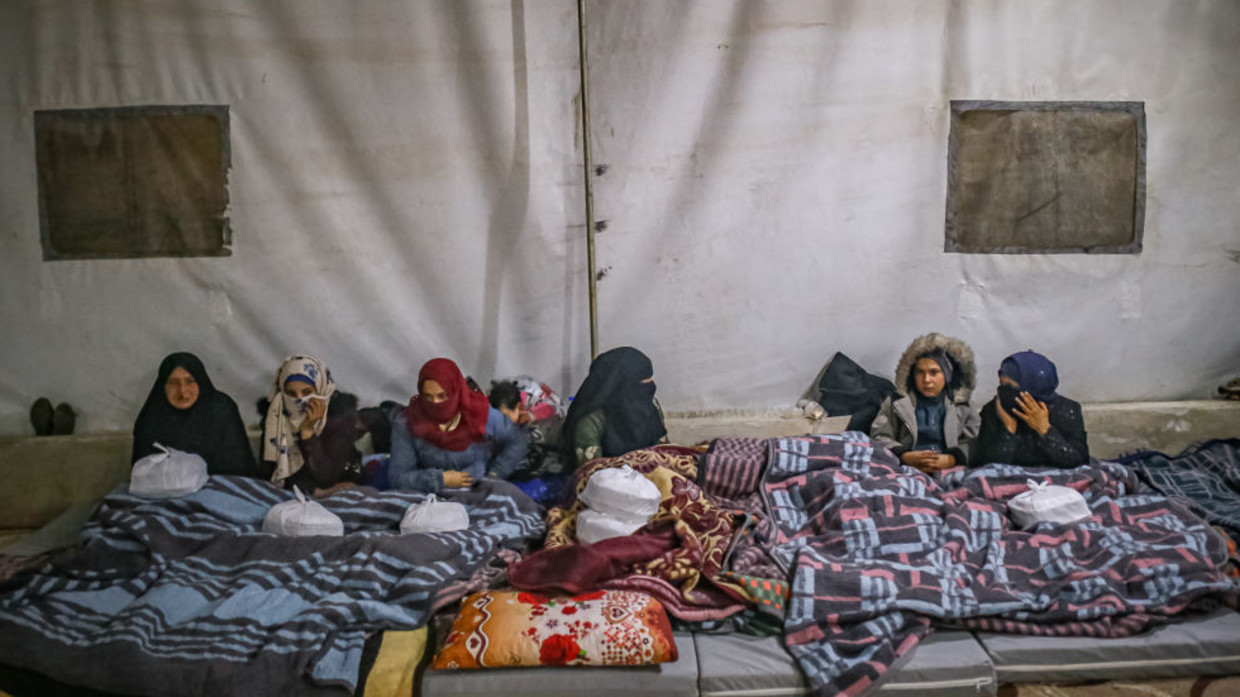 Syrian quake survivors stay at tents following 7.7 and 7.6 magnitude earthquakes centered in Turkiye’s Kahramanmaras, in Salqin district of Idlib, Syria on February 09, 2023. © Photo by Muhammed Said/Anadolu Agency via Getty Images
Syrian quake survivors stay at tents following 7.7 and 7.6 magnitude earthquakes centered in Turkiye’s Kahramanmaras, in Salqin district of Idlib, Syria on February 09, 2023. © Photo by Muhammed Said/Anadolu Agency via Getty Images
The economic stranglehold and selective approach to aid will lead to more death and displacement
Following the devastating earthquakes that rocked Türkiye, Syria and their neighboring countries on February 6, leaving more than 20,000 dead, Damascus is struggling to deal with this unprecedented humanitarian catastrophe as it remains under brutal Western sanctions that have brought the country to its knees.
The West’s war on Syria that began in early 2011 failed to topple its elected president, but the subsequent years of increasingly cruel sanctions – all in the name of ‘helping the Syrian people’ – have succeeded in rendering life miserable and near impossible, with most unable to afford to properly feed their families, much less heat their homes.
Now, in a time of crisis, the Syrian people cannot even receive donations or emergency support from abroad. One supporter set up a GoFundMe campaign, only to have it taken down due to the sanctions. Type the word “Ukraine” into the search field on PayPal or GoFundMe and you’ll see countless appeals for sending money to Ukraine. But for Syrians, Western platforms like these are off-limits, and have been for years.
Adding to the destruction left by war
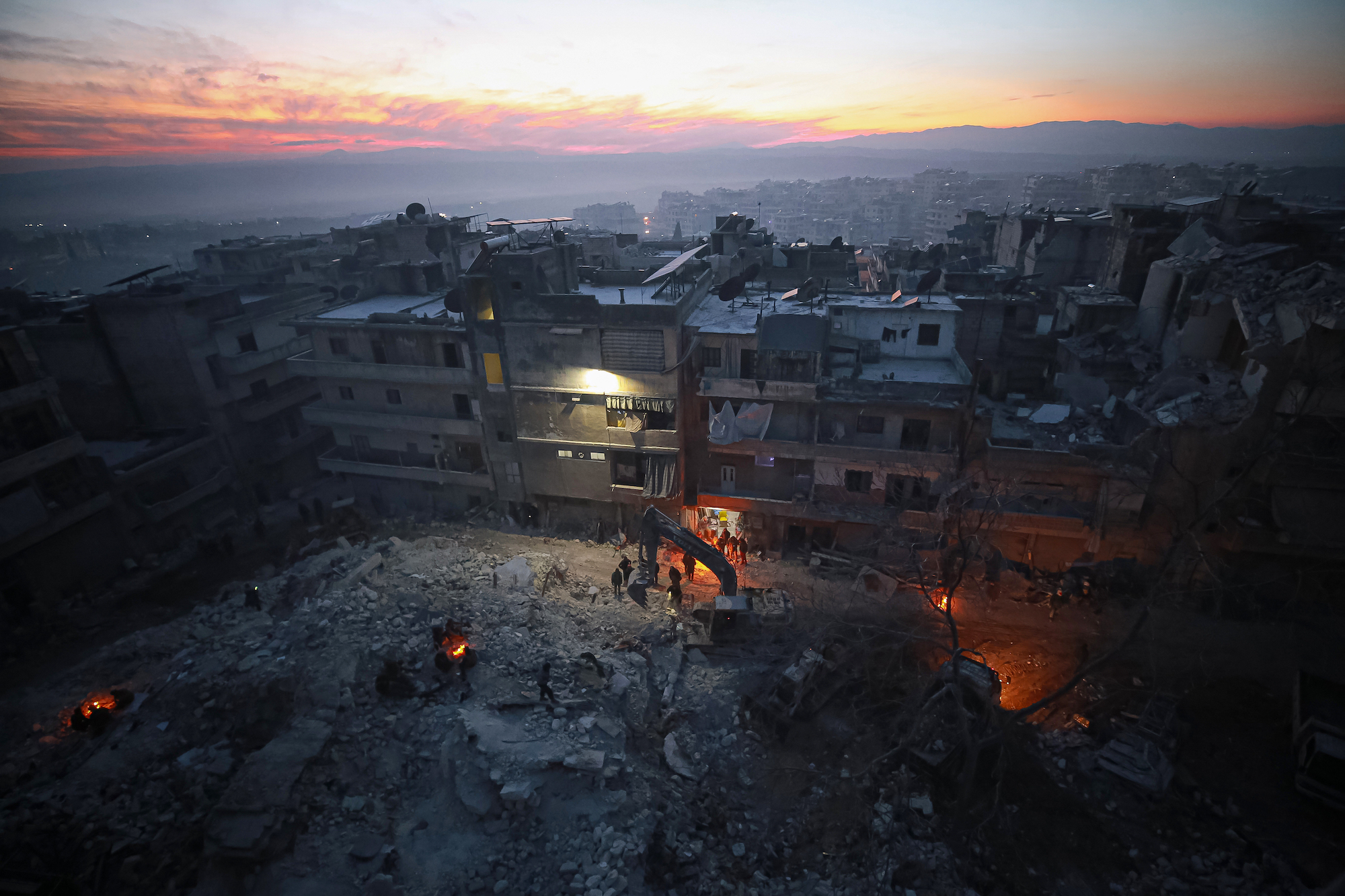
Search and rescue efforts continue in the Salqin district of Idlib, Syria, on Thursday. (Muhammed Said//Getty Images)
On February 6, southern Türkiye and northern Syria were hit by a 7.8-magnitude earthquake, followed by dozens of aftershocks and then another earthquake. While the neighboring countries of Lebanon, Jordan, Palestine, Iraq and others were affected, the worst of the damage was in Türkiye and Syria.
As of February 9, the official death toll in Syria was 1,347, with more than 2,300 injured. Nearly 300,000 Syrians have been displaced due to the earthquakes. The scenes initially coming out of Türkiye and Syria were heartbreaking and catastrophic, with buildings collapsing in front of people, and piles of rubble with the dead and the maimed trapped below.
In Syria, the earthquakes added to already extensive damage from the war. Aleppo, the country’s second-largest city, was tragically prone to building collapses because of the terrorist occupation that had lasted until 2016. The militants had frequently tunneled under buildings, in many cases in order to lay explosives and destroy them, as they did with the Chamber of Industry in April 2014. With the Syrian population already struggling to just survive prior to the earthquakes, now Aleppo and the coastal regions of Syria affected by the earthquakes face even more death, injury and displacement.
Sanctions were already killing Syrians
Even without the earthquakes, Syrians struggled to get medication, hospitals struggled to get or maintain critical machinery and equipment, and the population as a whole suffocated as the country’s economy steadily worsened, all by design.
Western leaders are adamant that the only ones to blame for the Syrians’ suffering before the earthquake were President Bashar Assad and his government (or “regime,” as Washington calls any undesirable foreign government it hasn’t yet toppled), whose “dictatorship” caused the people to rise up and start a civil war (actually a US-led proxy war against Syria to overthrow said government). The sanctions, ostensibly aimed at the “regime,” are, by this logic, intended to helpand protect the general population. In reality, they are strangling Syrian civilians.
Here’s what life is like for many Syrians now, according to British journalist Vanessa Beeley: “The US and its proxy Kurdish separatist forces are occupying Syrian resources in the northeast which includes their oil, which means of course that the bulk of Syria is reliant upon Iranian oil to keep any kind of electricity running. At the moment, we have basically about two or three hours of electricity per day. There is no heating in the majority of homes across Syria.”
As Beeley notes, earthquake-displaced Syrians – unless they receive emergency aid – face freezing and wet conditions, “without any alternative shelter, without any electricity, without any heating.” And thanks to the sanctions, desperately needed humanitarian aid and fundraising is difficult. International cargo planes can’t land in Syria, and crowdfunding services and even credit cards are unavailable. The virtue-signaling Western nations – the main cause of suffering in Syria since 2011 – have not only persisted in keeping the sanctions in place; most of them haven’t offered any meaningful help since the earthquake, just hollow words.
Thanks to criminal Western sanctions, international cargo planes can not land at Syrian airports and Syrians can not use Gofundme or credit cards. Meanwhile, the US military occupies 1/3 of the country, stealing Syria’s oil – a key source of revenue it uses to buy food and aid. pic.twitter.com/1jFXfJB2I8
— Max Blumenthal (@MaxBlumenthal) February 7, 2023
The Chinese Foreign Ministry blamed the sanctions for amplifying the miserable situation, and likewise pointed out that the US’ illegal presence in Syria and theft of Syrian resources was also exacerbating the economic situation.
“Frequent [US] military strikes and harsh economic sanctions have caused huge civilian casualties and taken away the means to subsistence of the Syrians. As we speak, the US troops continue to occupy Syria’s principal oil-producing regions. They have plundered more than 80% of Syria’s oil production and smuggled and burned Syria’s grain stock. All this has made Syria’s humanitarian crisis even worse.”
A friend in need is a neighbor on the sanctions list
All of the above has left Syrians to rely mostly on the country’s friends for help. Incidentally, many of those nations and groups are among the most vilified by the West.
The West imposes brutal sanctions against Syria, ruining every aspect of Syrians’ lives, + stealing their oil & creating the war on Syria in the 1st place.After the tragic earthquakes, who helps Syria? Those vilified by the hypocritical West: Iran, Russia, Iraq, Lebanon…
— Eva Karene Bartlett (@EvaKBartlett) February 7, 2023
Following the earthquake, Russia’s Ministry of Defense dispatched “over 300 personnel, and 60 military and special vehicles” for rescue and aid efforts in Syria. The Russian Emergencies Ministry sent more than 100 rescue workers to Türkiye and Syria, including an airmobile hospital with 40 medics.
Iran sent a plane with 45 tons of medical, food and sanitary aid to Syria, and has pledged to send more.
Even battered Libya, itself largely destroyed by another Western regime-change project, sent a plane with 40 tons of medical and humanitarian aid, as well as an ambulance, to Aleppo International Airport.
Hezbollah, the Lebanese resistance movement, sent convoys of humanitarian aid to Syria. Lebanon’s army said it would send members of its Engineering Regiment to Syria, to contribute to the search and rescue operations.
Not everyone who offered their help to Syria are on Western sanctions list, of course. Algeria sent 115 tons of aid of food and medical supplies, tents and blankets, as well as 86 specialized civil protection personnel. The United Arab Emirates will apparently send $50 million to Syria for relief efforts, and Indian, Emirati and Jordanian planes carrying humanitarian and medical aid for Syrian victims arrived in the capital on Wednesday. Even New Zealand pledged to contribute NZ$500,000 “for the Syrian Arab Red Crescent (SARC) to meet humanitarian needs.”
Meanwhile, Western corporate media stuck to the narrative of blaming the Assad government, with a New York Times article on the issue apparently saying initially that Western sanctions had hampered relief efforts to Syria – before quickly changing the line to say the government “tightly controls what aid it allows into opposition-held areas.” This is in-keeping with the old trope that the Syrian government denies aid to civilians in areas occupied by terrorists, which in most Western media are dubbed “rebels” and “opposition fighters.” This is something I and other journalists on the ground have repeatedly debunked, visiting liberated areas and hearing time and again that locals had been starving because terrorists had been hoarding humanitarian aid, denying it to civilians or selling it at massively inflated prices.
NYT never misses an opportunity to push West’s regime-change lexicon.”Opposition” = literally AL-QAEDA  Instead of calling for an end to the criminal sanctions against the Syrian people, NYT exploits humanitarian tragedy to push West’s agenda of toppling elected Syrian govt. pic.twitter.com/3RpsIiQ1VF
Instead of calling for an end to the criminal sanctions against the Syrian people, NYT exploits humanitarian tragedy to push West’s agenda of toppling elected Syrian govt. pic.twitter.com/3RpsIiQ1VF
— Eva Karene Bartlett (@EvaKBartlett) February 8, 2023
Western aid is not for everyone
On Thursday, the World Health Organization (WHO) warned about a looming “secondary disaster” in Syria, pointing to “major disruptions” to basic life supplies, but failing to highlight the role of Western sanctions or the terrorist presence in northwestern Syria as the underlying causes. Reports on UN aid reaching northern Syria via Türkiye also downplayed the presence of Al-Qaeda terrorists in the areas mentioned, as well as Türkiye’s years-long support for Syrian anti-government forces. Such reports likewise neglected to mention the need for emergency relief in government-controlled areas of Syria, and the government’s efforts to bring that relief in.
Some 12 years into the West’s proxy war on Syria, the continued denial of the very basics of emergency humanitarian relief to Syrians outside “rebel-controlled” areas, shows how little the West’s claim to care for Syrians really matter. The lack of concern by the UN, WHO, and affiliated aid agencies for the Syrians of Aleppo, among other government-controlled areas, is not at all surprising, given these bodies over the years systematically downplayed terrorism against Syrian civilians.
As the humanitarian disaster continues, it is also worth remembering that, over the decades, Syria has taken in refugees from numerous countries. Yet, in spite of the current emergency situation and the very dire need to lift the West’s sanctions, it is unlikely the “benevolent” West will change its crippling anti-Syria policies to allow Syrians to merely survive.
https://libya360.wordpress.com/2023/02/ ... rthquakes/
US is Brutally Politicizing Humanitarian Aid
Posted by INTERNATIONALIST 360° on FEBRUARY 10, 2023
Jeremy Kuzmarov
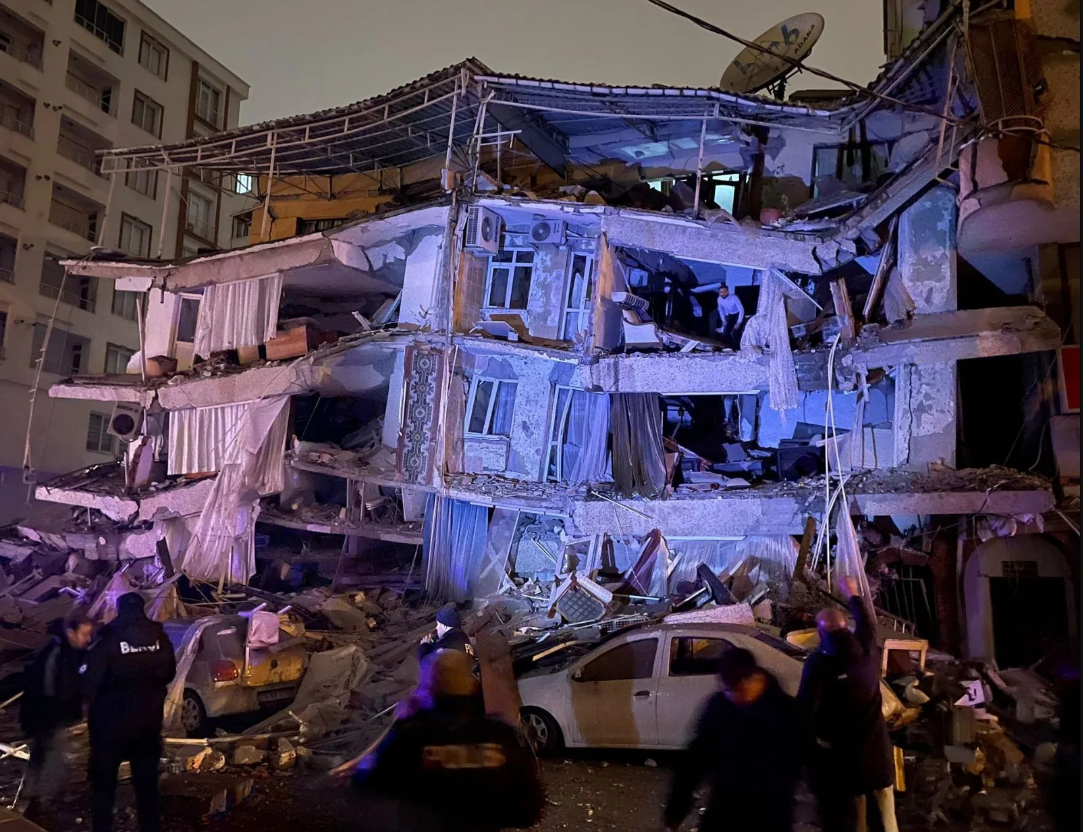 Brutally politicizing humanitarian aid, Biden assists Turkey but refuses to mobile aid and rescue workers to save thousands in northern Syria because of U.S. vendetta against Bashar al-Assad Government.
Brutally politicizing humanitarian aid, Biden assists Turkey but refuses to mobile aid and rescue workers to save thousands in northern Syria because of U.S. vendetta against Bashar al-Assad Government.
At 4:17 a.m. on February 6, a 7.8-magnitude earthquake struck Turkey and northern Syria, killing more than 21,000 people in what was the deadliest earthquake seen worldwide in more than a decade.
The Biden administration announced on Monday, soon after the quake struck, that it was coordinating any and all needed assistance with Turkish officials, deploying quickly to support Turkish rescue efforts, and sending a USAID disaster response team into Turkey.
Team Biden was much more muted with regards to Syria, stating that “U.S.-supported humanitarian partners are also responding to the destruction in Syria.”
These comments made clear the Biden administration’s refusal to work with the Syrian government, which has been the target of a U.S. regime-change policy since the early 2000s.
The humanitarian groups to which Biden is referring are NGOs operating in areas outside the control of the Syrian state, which may yet exclude the rest of the country from any such aid, including the badly hit city of Aleppo, which is under Assad government control.[1]
State Department spokesman Ned Price told reporters: “I will make the point that it would be quite ironic, if not even counterproductive, for us to reach out to a government that has brutalized its people over the course of a dozen years now—gassing them, slaughtering them, being responsible for much of the suffering that they have endured.”
These statements are callous, misleading and hypocritical.
Callous because of the desperate need for aid to reach Syria to save lives regardless of politics.
Misleading because Price suggests that the Assad government gassed its own people using chemical weapons when strong scientific evidence suggests that these alleged chemical gas attacks, if they actually took place, were carried out by Syrian rebel forces backed by the U.S. and Turkey.
And hypocritical because Washington supports many governments that brutalize their people—including Turkey, which a) has a ghastly record of terrorizing the Kurds; b) supported ISIS in Syria; c) supports Azerbaijan in its assault on Nagorno Karabakh; and d) has adopted increasingly autocratic measures toward dissidents at home under Recep Tayyip Erdogan.
But Turkey has been a U.S. ally for decades and a NATO member, and hosts the large Incirlik Air Base.
The Syrian government under Bashar al-Assad, by contrast, humiliated the U.S. by defeating a U.S.-backed uprising over the last decade with Russian assistance. Assad’s government has also allied with Iran and stood up to Israel, while resisting U.S. designs to build an oil pipeline that would have undercut supply routes from Russia.[2]
The Biden administration appears to see the earthquake as an opportunity to advance its regime-change agenda by exacerbating the suffering of the Syrian people and eroding the legitimacy of the government that cannot properly save them.
Erdogan’s government by contrast will gain in legitimacy from a strong response to the quake.

Flight tracker shows the absence of any aircraft in Syrian air space after dealing with the devastating earthquake while almost all aid and rescue teams are heading to Turkey.[Source: english.almayadeen.net]
EU Countries and NATO Follow U.S. Lead
Mimicking the Biden administration, NATO Chief Jens Stoltenberg voiced “full solidarity” with ally Turkey, saying he was in touch with Turkey’s top leadership and “NATO allies are mobilizing support now,” completely leaving out Syria.
British Foreign Minister James Cleverly said the UK was sending Turkey a team of 76 search and rescue specialists, equipment, and rescue dogs as well as emergency medical teams.
Cleverly left out Syria, similar to other Western allies like Germany, Poland and even Greece, Turkey’s historic enemy, which pledged “immediate assistance” to President Erdogan, though not Syria’s Assad—even though Assad issued an international appeal for humanitarian aid.
Of the aid that is getting through, the majority is coming from the Global South. Transport planes from the U.A.E., Iran, Oman, Egypt, Iraq, Armenia, China, India, Pakistan, and Russia have landed in Syria loaded with aid; Lebanon has made its sea and airports available for aid shipments Syria, and even Palestine has sent a rescue team.
Great Difficulties
A surgeon from Aleppo, Mohamed Zitoun, who spent years treating casualties from the Syrian war, said that he has never experienced anything like the number of injured and the scale of their injuries from the earthquake, and that the hospital’s emergency teams where he worked at Bab al-Hawa near the Turkish border were running out of antibiotics, sedatives, surgical supplies, blood bags, bandages and drips.[3]
Syria is facing special difficulties responding to the earthquake because a) the only crossing between Syria and Turkey that is approved by the United Nations for transporting international aid into Syria is not functioning, according to UN officials, because of earthquake damage to roads around it; b) Damascus International Airport is still undergoing repairs and maintenance following an Israeli air strike on the facility on January 2, which hinders the landing of humanitarian aid; and c) because of the ravages bred by Syria’s 12-year war and the brutal economic sanctions imposed by the U.S. and EU, which are not being lifted.
Al Mayadeen, a pan-Arabist Lebanese journal, reported on February 6 that, “due to the war that weakened the infrastructure in Syria, the draconian Western sanctions imposed on the country, the U.S. occupation of some Syrian land, as well as the looting of billions of dollars of its resources, Syria is unable to fully respond to the tragic catastrophe. As a result, the number of victims of the 7.8-magnitude earthquake is rising.”
U.S. Sanctions and the Caesar Act—an Instrument of Regime Change
The Carter administration first imposed sanctions on Syria in 1979 when it designated Syria as a “state sponsor of terrorism.”
New rounds were imposed in 2004 and 2011 when the U.S.-backed uprising against Assad began and he was accused of human rights abuses.
In December 2019, President Donald Trump signed the Caesar Act, under which anyone doing business with the Syrian authorities potentially became exposed to travel restrictions and financial sanctions while vital medicines and foodstuffs were blocked from entering the country.
The Caesar Act was named after a government defector, Caesar, who leaked thousands of photographs alleging torture of civilians by Assad’s security forces.
Nearly half the photos actually showed government soldiers who had been killed and victims of car bombs and other war-related violence, and many others showed soldiers who had died in combat—not government torture centers.
Caesar’s identity was also unclear and he was suspected of being in the employ of the CIA.
Lift Your God Damned Sanctions
Independent journalist Vanessa Beeley posted a report from a northern Syrian resident, Bashar Murtada, on her Telegram channel: “International cargo planes are unable to land at Syrian airports as a result of the U.S. blockade, and countries require Syrian airlines to transport aid on board their civil planes!!! As is well known, the so-called Caesar Act comes in the context of practicing economic terrorism and it is considered one of the most dangerous types of crimes against humanity.”
Beeley posted another statement from Aleppo businessman and former MP Fares Shehabi:
“Lift your God damned sanctions so we can open our airports to receive international aid! In Aleppo alone more than 50 buildings have been destroyed resulting in more than 160 deaths so far and thousands of injuries. Thousands of families are now without shelter! What kind of evil governments pose economic & travel sanctions on earthquake devastated nations?!”
So Sanctions May Not Turn into a Crime Against Humanity
Shehabi’s response was echoed by the Middle East Council of Churches (MECC), which called for the immediate lifting of sanctions imposed on Syria, charging that the current blockade has prevented their organization from carrying out relief operations for the earthquake throughout the country. “We urge the immediate lifting of sanctions on Syria and allowing access to all materials, so sanctions may not turn into a crime against humanity,” said the attendees of the Council in a statement.
Three prominent Christian leaders in Syria released a statement to similar effect, as did the UN Resident Coordinator in Syria, Mostafa Benjamilh, and the President of the Syrian Arab Red Crescent, Khaled Hboubati, who said during a press conference in Damascus that “the evacuation process and rescue operations are restricted due to obstacles resulting from the severe sanctions. We have shortage in heavy machines and equipment needed to lift the rubble. I don’t mean trucks or bulldozers, I mean specific machines that lift rubble without injuring people trapped under the rubble…. Now, with this natural disaster, it’s time to lift the sanctions.”
A Most Barbaric Response to Human Tragedy
Colonel (Ret.) Richard Black, who flew 299 combat missions in Vietnam and served in the Virginia State Senate as a Republican from 2012 to 2020, has been one of the few former high-ranking military officers or government officials to speak out against U.S. military intervention in places like Syria and Ukraine.
A day after the earthquake, Col. Black characterized the Biden administration’s response as “an act of vengeance against Syria’s rejection to submit to the U.S. regime-change war and sanctions imposed on their country for the past 12 years.”
Col. Black continued: “I have got to tell you, I have never seen such a barbaric response to a tragedy where you literally have people in Aleppo city, Syria who are looking up at piles of concrete, their lives are coming to an end, they’re freezing in the cold. They’re there without food, without water, and they’re dying. Meanwhile, the State Department takes that opportunity to re-emphasize the fact that we are bitter because we could not impose our will on the Syrian people.
“It was in 2020 that the United States imposed the Syria sanctions out of anger at the fact that Syria had driven back the ISIS and al-Qaeda terrorists that the United States had supported, and was trying to overwhelm the government with. So, now the State Department looks at this as an opportunity to simply ratchet up the regime of starvation and freezing that we have imposed on Syria through the cruel Caesar sanctions.
“I’m quite disgusted by the actions of the United States State Department. It is really unbecoming of any civilized nation that they would choose this moment to take out their vengeance on the poor suffering people of Syria.”
Notes:
1.Some of these organizations were infamous for staging false attacks to implicate the Syrian government in crimes it had not committed. Special advisor to Syrian President al-Assad, Bouthaina Shaaban charged that the West provides assistance to support terrorists in areas outside the control of the Syrian state, primarily concerned with protecting Daesh “ISIS,” “Jabhat al-Nusra” and the “White Helmets,” and isn’t interested in areas where most Syrians live.
2.Bashar’s father Hafez had allied with Nasserist Egypt and the Soviet Union during the Cold War. ↑
3.According to U.S. News & World Report, the hospital where Zitoun works is in an opposition-held enclave in northwest Syria, an area which bore the brunt of Russian and Syrian bombing during the country’s conflict, which killed hundreds of thousands, and where the towns are heavily populated with those who fled other areas of Syria. “The first massive wave of patients surpassed the ability of any medical team,” said the surgeon. The outpatient clinic was turned into a ward and mattresses were laid on the floor as the rooms filled with victims and despairing family members. “This is a huge calamity. I lived through shelling and survived massacres. This is totally different, terrifying and horrific.” ↑
https://libya360.wordpress.com/2023/02/ ... arian-aid/
While Cuba, Venezuela and China are Rushing Aid to Earthquake-Hit Syria, US Maintains Sanctions
Posted by INTERNATIONALIST 360° on FEBRUARY 10, 2023
Peoples Dispatch
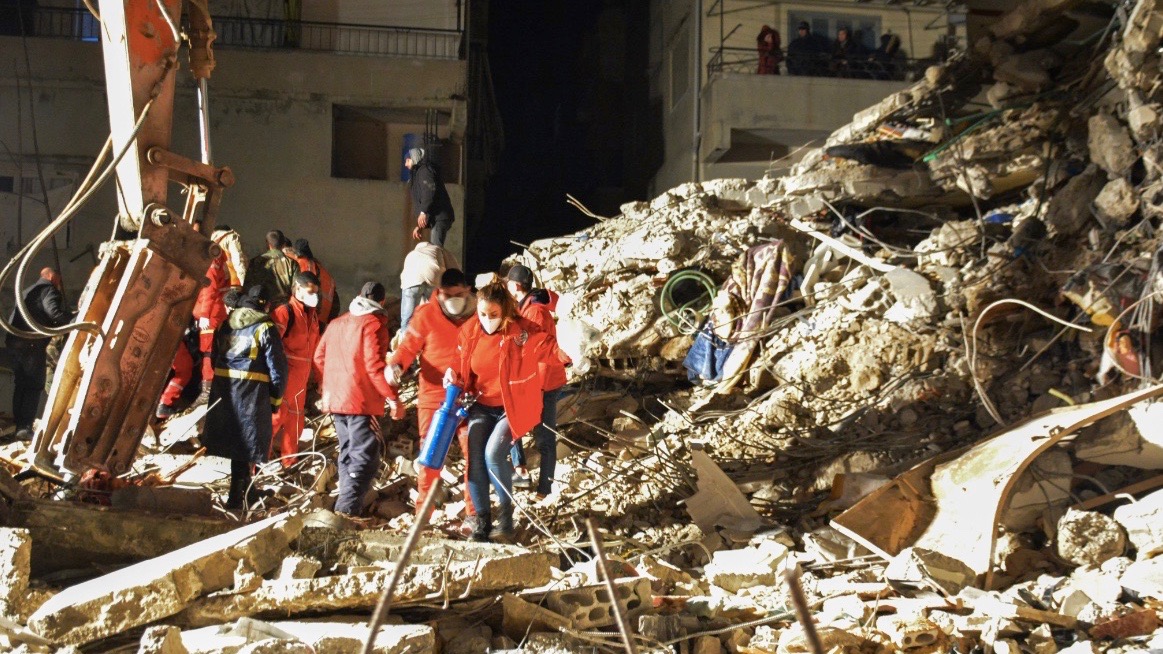
Syrian Red Crescent members conducting a rescue operation. (Photo:@SYRedCrescent/Twitter)
The US Treasury has issued a 180-day waiver on certain sanctions imposed on Syria to allow for earthquake relief. However, the US and its allies have yet to offer meaningful assistance to Syria even as Venezuela, China, Palestine, and others have dispatched aid and specialists
On Thursday, February 9, the United States Treasury Department announced a temporary waiver of certain sanctions imposed on Syria to facilitate relief and recovery efforts in the earthquake-hit country. The move follows growing international outrage and public appeals, including by the Syrian government and countries such as Venezuela and China, to remove the brutal and illegal sanctions that the US has imposed on Damascus.
At least 21,719 people have died—as of February 10—after a 7.8 magnitude earthquake on February 6 devastated large parts of southern and central Turkey as well as northern and western Syria. Over 79,000 people have been injured and over 3.7 million have been displaced since then, with rescue operations still underway in search of survivors in the midst of aftershocks.
The US Treasury’s Office of Foreign Assets Control (OFAC) issued a “blanket” Syria General License (GL) 23, “which authorizes for 180 days all transactions related to earthquake relief that would be otherwise prohibited by the Syrian Sanctions Regulations (SySR).”
Addressing a joint press conference at the United Nations headquarters on February 7, Syria’s Permanent Representative to the UN Bassam al-Sabbagh explained how sanctions were impeding humanitarian relief and access: “Lots of cargo planes refuse to land at Syrian airports because of the American and European sanctions. So, even those countries who want to send humanitarian assistance, they cannot use the airplane cargo because of the sanctions.”
The head of the Syrian Red Crescent, Khaled Hboubati, stated during a press conference on Tuesday that “There is no fuel even to send [aid and rescue] convoys, and this is because of the blockade and sanctions.”
Meanwhile, in its statement on February 9, the US government reiterated that its sanctions do not target “legitimate humanitarian assistance”—a claim proven false in other countries that have also been targeted by US sanctions. The risk of obstruction of humanitarian aid is also heightened due to possible overcompliance, and particularly in the case of Syria due to the “unfettered emergency powers” and “extraterritorial reach” granted under the US’s Caesar Act.
The US claims that GSL 23 “expands upon” the “broad humanitarian authorizations already in effect under the SySR for NGOs, international organizations (IOs) and the US government.”
However, over the past week, people on social media platforms have reported that US-based fundraising company GoFundMe was suspending accounts that were attempting to raise money for Syria.
Countries dispatch aid to Syria and Turkey
While the US and its allies rushed to mobilize and dispatch rescue teams and supplies to Turkey, they have dragged their feet to provide even the bare minimum aid for Syria by refusing to meaningfully lift sanctions to allow aid to reach the country. Despite this, there are countries around the world that have been providing critical on-ground assistance to both Syria and Turkey.
On Thursday, 25 specialists part of the Simon Bolivar Humanitarian Task Force arrived from Venezuela to Damascus accompanied by 12 tonnes of medicine, drinking water, and food. A day prior, the government of Venezuelan President Nicolas Maduro had dispatched 52 specialists to Turkey and Syria to assist with relief efforts.
A team of Cuban doctors from the Henry Reeve International Brigade has also arrived in Turkey. On Wednesday, Syria’s ambassador to Cuba Ghassan Obeid confirmed that 27 doctors from Cuba will also arrive in Syria soon to assist affected populations and local authorities.
China announced that it will be providing the first tranche of $5.9 million in emergency aid to Turkey. Beijing also dispatched an 82-member rescue team that arrived in Turkey’s Adana airport on Tuesday, bringing with them 20 tonnes of medical aid and rescue supplies.
On Thursday, China’s ambassador to Syria Shi Hongwei told CGTN that the first Chinese rescue team had arrived in Damascus, accompanied by an initial batch of medical supplies. A spokesperson from the Chinese Foreign Ministry had announced on Wednesday that China will offer USD 4.4 million in emergency aid to Syria.
A team of 73 rescuers, including members of the Palestinian Red Crescent and the Palestinian Civil Defense, headed by the Palestinian International Cooperation Agency (PICA), left for Jordan from the Occupied West Bank on Thursday, from where they will be divided into two teams—one headed to southern Turkey and another headed to northwest Syria.
Russia had dispatched four aircrafts on Monday with over 100 emergency response specialists, including medics to assist in search and rescue operations in Turkey and Syria. Algeria also sent over 100 tonnes of medical supplies, food, and tents, as well as a Civil Protection team that arrived in Aleppo earlier this week. India has also dispatched aid supplies to Syria, along with dispatching rescue teams to Turkey.
Countries including Iraq, Jordan, UAE, Pakistan, and Tunisia have also provided emergency assistance and supplies, even as various other countries have expressed messages of solidarity.
The UN has stressed that sanctions should not prevent the delivery of assistance to the Syrian people. According to the International Organization of Migration (IOM), 14 humanitarian aid trucks had crossed into northwestern Syria on Friday, bound for rebel-held Idlib.
From Iran, the sixth plane carrying humanitarian aid, including infant formula and food, was reported to have landed in Syria early on Friday. The Iranian army and the Iranian Revolutionary Guards Corps (IRGC) have also dispatched equipment for a 50-bed mobile hospital along with 70 relief and medical staff to Turkey.
The first Iranian plane had landed in Damascus on Tuesday, carrying 45 tonnes of food and medical supplies. Iran has also sent planes carrying aid to Latakia and Aleppo—where IRGC commander Brigadier General Esmail Qaani arrived late on February 8 to supervise aid delivery.
Meanwhile, Israel has already threatened a military attack, with an unnamed military official citing “information” that “indicated” that Iran might “take advantage” of the situation and send weapons along with humanitarian aid to Syria.
Israel has continued to carry out illegal and unilateral acts of aggression against Syria, including airstrikes that have killed numerous civilians and caused damage to critical infrastructure. According to Al Mayadeen, the airport in Damascus, which has been repeatedly targeted in such attacks, is reportedly still undergoing repairs after it was hit by an Israeli airstrike in January.
Sanctions on Syria
The urgent need for the removal of illegal sanctions on Syria is not limited to the immediate earthquake recovery efforts. The fact is that Western sanctions had already precipitated an economic and infrastructural collapse in Syria well before the earthquake hit this week.
In November 2022, following a visit to the country, UN Special Rapporteur Alena Douhan described the impact of the “outrageous” and “long-lasting” unilateral sanctions that were “suffocating” millions of Syrians. Douhan stated that 90% of Syria’s population was living below the poverty line, and access to food, water, electricity, fuel, shelter, transportation, and healthcare were limited. She added that more than half of the country’s vital infrastructure had either been completely destroyed or was severely damaged.
At the same time, unilateral sanctions on key sectors including oil, gas, electricity, and trade had “quashed” the national income and undermined efforts towards economic recovery and reconstruction.
“Maintaining unilateral sanctions amid the current catastrophic and still-deteriorating situation in Syria may amount to crimes against humanity against all Syrians,” Douhan had warned.
Threats to public health and food security have been heightened due to the unavailability of equipment and spare parts to fix water distribution and irrigation systems. There are acute disruptions in access to electricity, which have also impacted the functioning of medical equipment in hospitals.
As the US boasts of its “commitment to support the people of Syria through their ongoing earthquake crisis,” the question arises: what does a 180-day waiver on earthquake relief transactions actually achieve in the face of this level of destruction?
As Syria looks towards long-term reconstruction and recovery, any commitments of support or assistance are rendered meaningless in the absence of the total lifting of the illegal and inhumane sanctions that continue to choke the country.
https://libya360.wordpress.com/2023/02/ ... sanctions/

